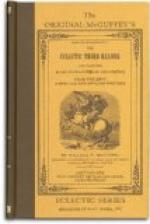act’ed failed quar’reled ex pand’ed land’ed rained bar’reled mer’it ed rest’ed coaxed trav’eled vis’it ed
Y is sometimes changed into i; as cry, cried.
cried dried mar’ried glo’ried tried fried tar’ried sto’ried shied spied car’ried wor’ried
Lesson 144.
Ar, er, and or signify one who does, or that which does; as, baker, one who bakes. If the word ends in e, r only is added. After a consonant y is generally changed into i. Another letter is sometimes united to the affix; as law, law’yer. The final consonants are doubled, as in Lesson 142.
beg’gar bank’er bak’er cre a’tor dig’ger plant’er pa’cer cru sad’er dip’per build’er pav’er dic ta’tor clip’per giv’er stran’ger en grav’er trot’ter 1aw’yer writ’er sur viv’or los’er saw’yer boast’er be liev’er woo’er read’er mourn’er ad vis’er vouch’er rid’er own’er as sign’er wres’tler dy’er rul’er in vei’gler
Lesson 145.
Words formed by the Affixes er or or.
be gin’ner la’bor er nav’i ga tor in dors’er rea’son er ded’i ca tor de sert’er li’bel er cal’cu la tor dis turb’er wag’on er spec’u la tor u surp’er con’quer or pros’e cu tor con duct’or for’eign er cul’ti va tor tor ment’or cus’tom er mul’ti pli er en chant’er mur’der er nu’mer a tor sup port’er gov’ern or gen’er a tor ag gress’or pen’sion er ra’di a tor
Lesson 146.
In adjectives, er is generally added to form the comparative, and est to form the superlative; as, rich, richer, richest.
strict’er fierc’est wealth’i er wor’thi est broad’er slow’est greed’i er read’i est bright’er gaunt’est drear’i er haugh’ti est
Ly is an abbreviation of like; as manly for man-like, or like a man. Ly is still further shortened into y; as, rock, rocky.
bright’ly eas’y heav’i ly thor’oug ly gay’ly earth’y heart’i ly might’i ly no’bly speed’y read’i ly has’ti ly wind’y spon’gy tar’di ly stead’i ly
Lesson 147.
Ness is from the Saxon nesse, and means state or quality; as, neatness, state of being neat.
bleak’ness smooth’ness come’li ness fierce’ness numb’ness drow’si ness hoarse’ness wrong’ness naught’i ness calm’ness sweet’ness wea’ri ness
The termination full adds its own meaning to the word; as, joyful, full of joy. The final l is omitted in the derivatives.
change’ful mourn’ful skill’ful fan’ci ful fright’ful woe’ful will’ful pit’i ful spite’ful wrath’ful aw’ful du’ti ful
Lesson 148.
The termination less gives a negative meaning to the derivative; as graceless, without grace.
brain’less sight’less friend’less worth’less cease’less soul’less head’less house’less guile’less friut’less guilt’less noise’less
The affix age signifies the pay for, a state of being, or composed of; as cartage, the pay for carting.




